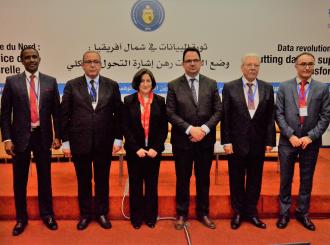
Tunis, 27 October 2018 (ECA) – The ECA office for North Africa, in partnership with the Tunisian Ministry of Development, Investment and International Cooperation (MDICI) and the Tunisian Union of Industry, Trade and Handicrafts (UTICA), launched on Tuesday in Tunis (Republic of Tunisia) the 33rd session of the Intergovernmental Committee of Experts under the theme : “Data Revolution in North Africa: Using Data in Support of Structural Transformation”.
This event is taking place within a complex economic context marked by growing protectionism. Although growth in North Africa reached 4.8% in 2017 and significant social progress has been made, the region is being been faced with major challenges including a relatively high unemployment rate and inequalities in the distribution of growth benefits within the countries.
During the five-day event, about 150 participants, including representatives of the member countries of the ECA Office for North Africa (Algeria, Egypt, Libya, Mauritania, Morocco, Sudan and Tunisia) will discuss various issues, suggest orientations and guide the Office’s work. Other participants include the General Secretariat of the Arab Maghreb Union, the private sector, civil society, the North African academic sector as well as UN and development organizations.
“The situation in North African countries and the rest of Africa calls for new solutions to issues that are becoming more and more complex”, said Lilia Hachem Naas, Director of the ECA Office for North Africa.
“We need to measure, as precisely as possible, the phenomena taking place around us to better understand, manage and control them”, said Tunisian Minister of Development, Investment and International Cooperation Zied Ladhari, who announced that his country is currently working on a draft law on data use and dissemination.
In a video message to the participants, ECA Executive Secretary Vera Songwe stressed the need to use data to design better targeted government policies and ensure that we really work towards Africa’s development. Data has become a priority in the last few years, and we hope discussions this week will help us increase the use of data in North Africa, including the use of Big Data to find adequate solutions to the region’s issues, she added.
Throughout the week, participants will discuss various topics including how to improve statistical systems, the role of new technologies in data collection, analysis and dissemination, employment statistics and the use of statistical data to facilitate the monitoring of SDG and Agenda 2063 implementation.
“In the age of information and communication technologies, having reliable, good quality data is key in achieving these various objectives and policies », confirmed Taïeb Baccouche, General Secretary of the Arab Maghreb Union (UMA).
“We hope this meeting will help identify major issues North African countries have in common and suggest relevant action plans”, said UTICA chairman Samir Majoul, who called on ECA to organize a special session on modalities to strengthen the formal economy while freeing it of all the constraints that slow down its development.
Participants will also have an opportunity to take stock of the progress made towards SDG implementation in Maghreb countries (Algeria, Mauritania, Morocco and Tunisia), the African Continental Free Trade Area (AfCFTA), and explore themes such as blue economy and the inclusion of migration in North African national development policies.
For more information, please visit https://www.uneca.org/events
Communication Team
Economic Commission for Africa
Office for North Africa
Tel: +212 (0) 537 548 749
Email: filali-ansary@un.org; cea.an.coms@gmail.com